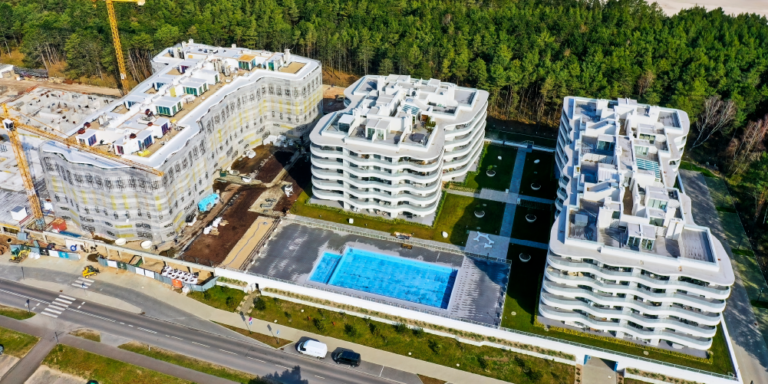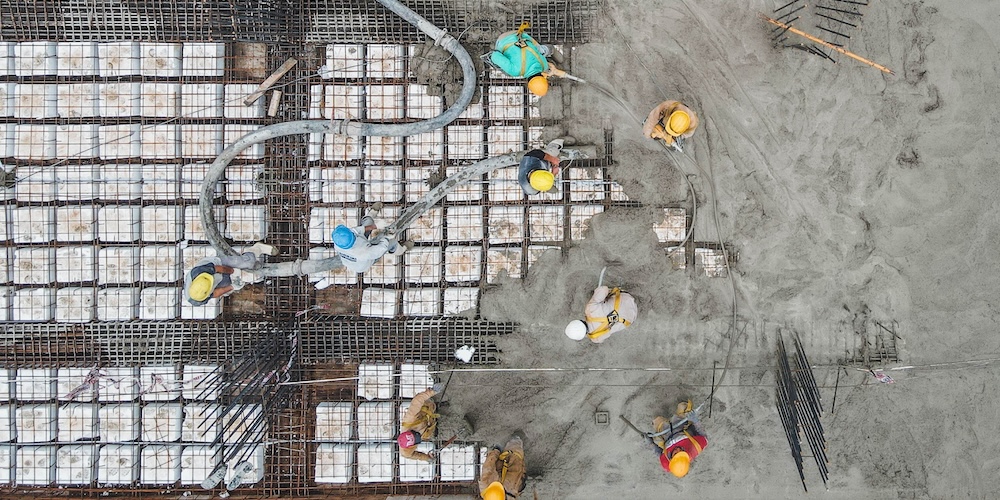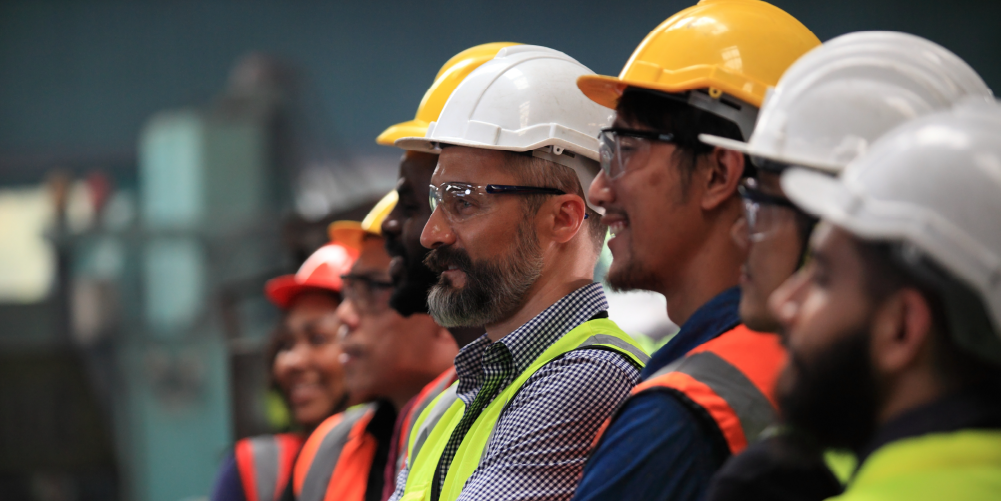— 9 min read
Hotel Construction: Building Hospitality from the Ground Up
Last Updated Jun 19, 2024
Last Updated Jun 19, 2024

It’s not surprising hotel construction is often a demanding and exciting process, as hotels need to have the comfort of a home and the durability for heavy usage of a restaurant on the scale of an office building.
For owners, hotel construction is a chance to create something unique yet practical that has the potential to bring huge returns for years to come. For contractors, it’s a chance to build something at scale that is prominent, lasting and can open the door for more work in the future.
This article explains hotel construction, including best practices, common roles and responsibilities and how hote construction differs from other commercial projects.
Table of contents
The Basics of Hotel Construction
Hotels, in this case, can refer to everything from towering high-rises and one-story motels to luxury resorts. They are largely defined by their short-term usage, but the construction of hotels is largely defined by scale. Hotel construction often requires work happening on numerous floors, by numerous trades, sometimes simultaneously, in units that can number more than a thousand.
Executing at such a large scale can be challenging, but it can also make certain parts of the process more efficient or economical. Plans and processes can often be repeated across rooms, floors, or sections. Similarly, finding savings on a component in one room can be multiplied many times over.
A great example is furniture, features, and equipment (FF&E), which includes permanent or semi-permanent fixtures such as beds, dressers, or chairs. It can be challenging to find a vendor with such a large quantity of items that look similar or identical — but once they’re found, buying things at scale often results in lower prices per item.
Hotels usually must be able to fulfill a variety of purposes beyond simply housing people temporarily. They often have a lobby area to welcome guests and do business, amenities ranging from laundry to full gyms — and some have dining or conference areas. Hotels sometimes lease space to restaurants, coffee shops or stores, which each might have their own needs and vision for the construction of their space. However, a few major companies dominate the hotel industry, which usually increases standardization and can make construction a more predictable and routine process.
Stay updated on what’s happening in construction.
Subscribe to Blueprint, Procore’s free construction newsletter, to get content from industry experts delivered straight to your inbox.

The Hotel Construction Process
Much of the hotel building process is similar to that of any commercial project. However, there are key differences in each phase of construction.
Planning
Understanding local codes and regulations is one of the most important parts of the hotel planning process. Most cities have specific zoning requirements for hotels, which determine a building’s maximum occupancy. Many places have specific building requirements for hotels. For example, New York City doesn’t allow the use of PEX pipes, while across the river in New Jersey, PEX pipes are common. Requirements can usually be found by contacting the municipality or visiting their website — for example, take a look at Dallas’ hotel zoning information.
During planning, or sometimes even before that, owners will usually launch a hotel feasibility study to assess if a hotel would be a good investment in a given area. Owners will often use this time to begin to set a vision for the hotel that sets them apart from the competition while also considering national standards and meeting the needs of people who visit the area.
A hotel’s purpose, likely clientele and location inform every part of the planning and design process, as well as its branding. These things are usually reflected in signage, amenities offered and building layout. A hotel next to the airport won’t just look different than one in a historic downtown area — it will also likely be a different size and offer different amenities and accommodations, such as dining and parking.
Preconstruction
Because of the scale of construction with most hotels, there’s a specific emphasis on budgeting during the preconstruction phase. Increased value or reduced costs found through tracking material prices or through value engineering can be multiplied across different units and floors. On the other hand, delays can also be multiplied, so assessing and monitoring lead times for material procurement is equally important.
Understanding the hotel’s targeted clientele can help make decisions about the quality, durability, and price of FF&E. Compared to owners of other commercial buildings, hotel owners are more likely to take responsibility for sourcing and buying FF&E. They often know exactly what they want and don’t want to pay contractors to get them.
Construction
The construction phase is usually the time when the scale of the project can become an asset, as subcontractors often repeat work in different units or on different floors. The repeatability of some of the work means it can be done quickly and efficiently, though this increases the importance of routine inspections to catch mistakes before they are duplicated.
The construction phase requires organized and deliberate systems for managing resources, including crews who might work in shifts around the clock to get a job done on a tight timeline. Teams should know as far ahead as possible when they will need to be on site. Staging and storing materials, accepting deliveries, and managing large equipment such as cranes is particularly difficult with hotel construction, as hotels are often built in areas that are densely populated or trafficked, such as tourist or business centers.
Learn about best practices for construction scheduling to help deliver projects on time.
Post-Construction
The punch list can be particularly extensive with hotel construction, as each unit and floor has detailed finishes needed to be ready for use. Often, GCs will do thorough pre-punch walks to catch issues before the official walkthrough with the owner.
The scale of a hotel construction project can also complicate closeout documents. The sheer number of operation manuals, warranties, and payment requests require an immense amount of organization and efficiency to ensure an effective handover.
Roles and Responsibilities In Hotel Construction
The roles on a hotel construction project are usually similar to those on other commercial projects, but their responsibilities are often specialized.
| General Contractor | Given the average size of hotels and their tight timelines for completion, a general contractor (GC) and their construction manager (CM) should be skilled at material storage and installation, effective at communicating with multiple stakeholders including local municipalities. They should also be able to organize large amounts of documents and submittals, and, perhaps most importantly, experienced at managing multiple disciplines of subcontractors simultaneously and at scale. |
| Owner | Compared to owners of other types of commercial properties, hotel owners tend to be more involved in the construction process. Because they are usually very focused on the experience of their future customers, owners tend to be hands-on with developing a vision for the hotel, sometimes even down to the electrical outlets in each unit. Because of this, hotel owners often take on the responsibility of sourcing and managing the procurement of furniture, features, and equipment (FF&E). |
| Design Team | With each hotel project, the design team must be able to meet or exceed industry standards, company branding, and customer expectations while also developing a unique identity to set the hotel apart from competitors. Because hotels usually have different spaces with distinct purposes, hotel design teams often include many different types of designers. This might include an architect of record, interior designer, kitchen designer, landscape architect, a back-of-house designer, and a concept design architect, whose primary responsibility is to manage scale- and other hotel-specific issues. |
| Suppliers and Vendors | Most suppliers and vendors in hotels are specialized in selling FF&E in very high quantities. Some vendors work to establish relationships with hotel chains that like to standardize the interior at each of their locations. |
Common Challenges in Hotel Construction
Scale is, of course, a defining challenge in hotel construction, but there are other common challenges.
Tight Schedules
Most hotels need to open as close to their target completion date as possible to meet their financial goals, so they are often constructed on tight timelines. Delays can result in the owner losing large sums of money and, in worst-case scenarios, the contractor having to pay liquidated damages. To accelerate the build, numerous crews are sometimes brought on so work can happen in shifts around the clock.
Dense Environments
Hotels are often in densely populated and trafficked areas, making it difficult to manage materials, deliveries, large equipment such as cranes and shut down streets when necessary. Many GCs regularly review local codes and foster relationships with the municipality and neighbors to avoid fines, tickets and contentious relationships.
Best Practices in Hotel Construction
A few things can help make the hotel construction process more efficient and manageable.
Get organized.
A GC must be able to monitor what’s happening on numerous floors, with numerous subcontractors, and collect all documents and submittals. Digital tools can often help to organize documents and share them with stakeholders. Procore has tools that can track change orders, build action plans that are visible to all parties, and automatically generate submittals.
Schedule regular OAC meetings.
Owner, architect, and contractor (OAC) meetings are routine gatherings with key stakeholders to make decisions, address issues and complete tasks needed to keep a project moving forward. On large projects such as hotels, these meetings can be a way to improve communication, problem-solve and account for each stakeholder’s priorities.
Use value engineering.
Because of the repetition in hotel construction, finding places to increase value or reduce cost can have positive effects that are multiplied many times over. Value engineering can be a simple way to identify what each element in a hotel needs to do and find a more effective or less expensive way to fulfill the same purpose.
Hotel Construction: Just The Beginning
Hotel construction happens on a large scale, requires extreme attention to detail, and can include distinct spaces with vastly different uses in the same structure. While these things can make the work demanding, they’re also what make the work in-demand.
Hotels are common in most parts of the world and owners are always looking for contractors with experience in hotel construction. Even beyond the hospitality industry, completing a functional and attractive hotel can demonstrate proficiencies in building at scale, on tight timelines, and for different usages that translates to most types of commercial construction.
Was this article helpful?
Thank you for your submission.
100%
0%
You voted that this article was . Was this a mistake? If so, change your vote here.
Scroll less, learn more about construction.
Subscribe to The Blueprint, Procore’s construction newsletter, to get content from industry experts delivered straight to your inbox.
By clicking this button, you agree to our Privacy Notice and Terms of Service.
Categories:
Tags:
Written by
Jonathan Casilli
Jonathan Casilli joined Procore in June 2022 as a Senior Strategic Project Consultant specializing in Project Management, Core, and Quality & Safety. Jonathan has 13 years of combined GC/Owners/Consulting experience in the construction industry. He has served in various positions as an Estimator, Project Manager, Owners Rep, Director of Construction and Founder in and around the NYC Metro area. He is currently based in Las Vegas.
View profileJames Hamilton
70 articles
James Hamilton is a writer based in Brooklyn, New York with experience in television, documentaries, journalism, comedy, and podcasts. His work has been featured on VICE TV and on The Moth. James was a writer and narrator for the show, VICE News Tonight, where he won an Emmy Award and was nominated for a Peabody Award.
View profileExplore more helpful resources

Construction Manager vs. Project Manager: Comparing Leadership Roles
Skillful oversight of construction projects allows companies to deliver to owners on time and within budget. Construction managers (CMs) and project managers (PMs) provide the necessary supervision to keep projects...

Mastering Construction Resource Management: Strategies for Success
Completing construction projects successfully requires the careful management of various resources: labor, materials, equipment, money, time and information. Since these resources are finite, allocating them wisely is crucial for minimizing...

Managing Construction Projects in Different States: A Contractor’s Guide to Working Across State Lines
For many general contractors, taking on work in a new state or region can offer transformative opportunities for building a thriving business and a respected reputation. But managing projects is...

Construction Teamwork: Build a Solid Foundation With the Right Team
Construction is an industry of collaboration — no one person completes any job on their own. It could easily be argued that the most important skill for anyone in this...